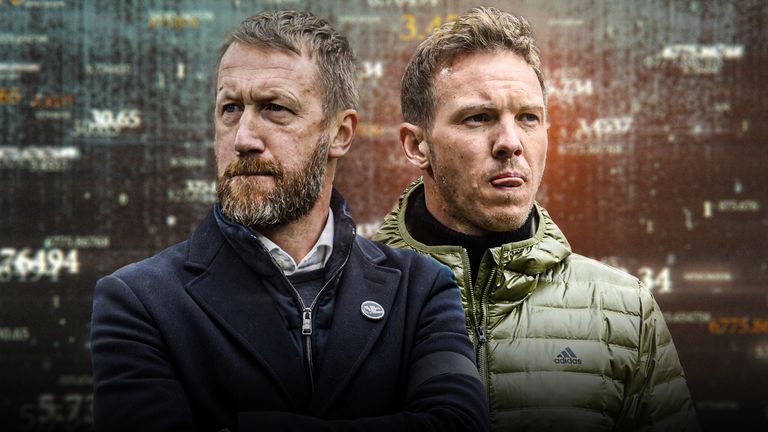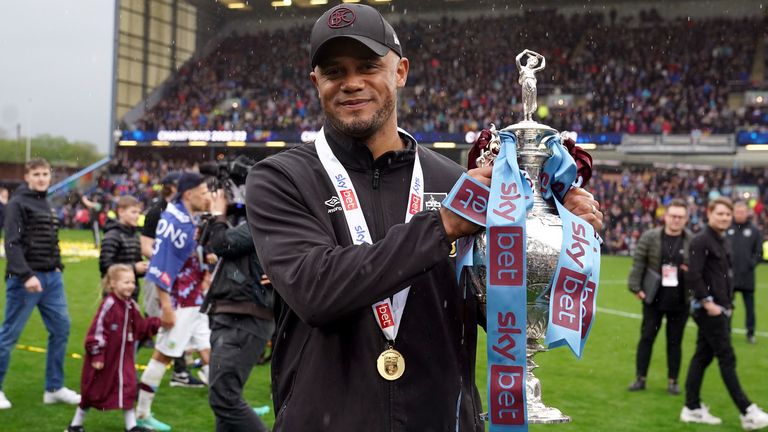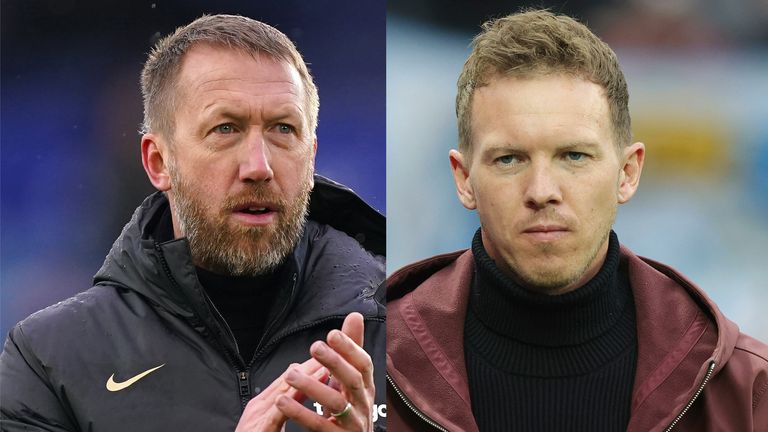Future of Football: The new transfer market for managers
As the price of hiring managers goes up, clubs are delving deeper into data to make sure they make the right appointment; we explore how clubs are deciding on a style of play and profiling managers to fit their plans; plus how data could add diversity to the dugout...
Thursday 14 September 2023 07:20, UK
A revolution in recruitment is under way in the world of player scouting - but how clubs find and hire managers is changing too.
With the rise of sporting directors, head coaches are being asked to focus on the football and buy into clubs' playing-style ethos. Data analysis is opening up the talent pool. And as compensation packages rise, the value of the manager has never been financially greater.
So how will this role continue to evolve in the coming decades? How will clubs recruit the leaders of their teams? And could a more analytical approach create the environment for increased diversity in the dugout?
Finding the right fit and a remit to focus on the football
"Not too long ago it was, 'He used to play for us, let's give him a chance. He's the right kind of character. He's got that bulldog spirit. He's a real leader'. That has totally changed and I can see that evolving more in the future."
As Sky Sports News chief reporter Kaveh Solhekol notes, while the 'who you know' attribute may not have been entirely removed from the process, data-hungry clubs have overseen a huge shift in the way they appoint head coaches.
"There are huge costs associated with managerial appointments which don't suit what's happened before," adds Alex Stewart, head of content at Analytics FC, a data-led consultancy for clubs.
The focus now is on how coaches can fit into a club's desired style of play, reducing the potential problems that can arise when a squad becomes a mish-mash of players wanted by different managers with different visions.
"Swansea were one of the teams that had a strong philosophy," says Dean Eldredge, an agent for managers at Oporto Sports. "They recruited managers including Roberto Martinez, Paulo Sousa, Brendan Rodgers and Michael Laudrup and they went through a run where - no disrespect to those four and not to be negative - it almost didn't matter who was in charge because they had a strong philosophy.
"They had a playing style, they had a type of player they went for. I think that's really important."
At Analytics FC they offer clubs their Coach ID product, a service to help execs find suitable appointments with the help of data. "Football clubs can develop a strategic vision for a type of football that they'd like to play. That means you can immediately start to assemble a list of coaches that hit those style points," says Stewart.
"We can say, 'OK, this coach is a such and such type of coach. He's a park-the-bus coach, he's a direct domination coach...'. Clubs like this, they like to be able to have it broken down for them in fairly simple terms.
"'If we hire this guy, it's going to be a massive jump in style terms from the person that we've just sacked'. That's obviously not a great idea, or it might be what they want to do, and then they're aware of that and they're aware that the playing squad is going to have to transition.
"Ultimately data is about helping clubs make better decisions and providing them with that information. We're not telling them 'You definitely need to do this or that' necessarily, but we're providing a suite of information that says, 'If you hire this person instead of that person, then it's going to take a greater degree of adjustment in the playing squad'.
"When football clubs have to spend not just an increasing amount of money on coaches' wages and transfer fees [for coaches] but also increasing amounts on player wages and player transfers, it's really important not to get that decision wrong or to make that decision in the most informed way possible."
This search to ensure each appointment has been thoroughly scrutinised is taking clubs to new levels of detail.
"I've spoken to some owners who've said that when they are recruiting a prospective manager, they watch drone footage of their training sessions to see exactly what goes on in training and what they do with the players and what kind of formations they use," says Solhekol. "They go into a lot of detail and that has totally changed."
It's a move which makes sense.
"A lot of clubs will have hired a manager without ever seeing them coach," says Eldredge. "They might have watched the games but not seen them coach.
"What if they don't coach? Are they the kind of manager that actually just walks around the training ground and oversees and they let their coaches do it?
"What do you really know about this candidate as a person and in their role?"
Finding a coach which fits your style, your squad and the environment at your club has never been more important.
The role of data in the manager search
To get that 360 picture of a head coach, clubs are mining data, digging into the numbers to try to compare coaches and put their achievements into context.
"Data is really important," says Eldredge.
"Can you look at, for example, a manager's win percentage as an accurate barometer for whether they're a good manager or not? Well, could you break it down and say, 'the win percentage is low, but actually that's because he is only ever been involved in relegation battles'. Did he keep them up? Yes. He's never been relegated. So there's, there's that.
"If the win percentage is high, over 50 per cent for one or two seasons, they were at a club where they were winning lots of games - was that expected?
"What was the actual job that the manager was doing versus what was expected of the club?
- Get Sky Sports | Download the Sky Sports App
- Stream Premier League football on NOW from just £11.98 a day
"And then you could break it down even further. What is the average age of the squads that this manager has worked with? Does that fit with your club? If the manager prefers to work with older players, more experienced pros, and you've got a young squad, does the manager fit that profile or that philosophy of the club?
"What are his possession stats? Is that even important to you? How many times do his teams get into the final third? Has the manager managed similar clubs to yours?"
Again, that data research can be married with other forms of analysis to give clubs a clear understanding of whether or not a coach is the right fit.
"If you were looking at a player, you'd go and look at their videos and you'd go and watch them play in different scenarios," says Eldredge. "Why wouldn't you do that with a manager?
"Why not go and watch a manager's team play away from home? How does he set up in a derby game? How does he set up in a play-off game or a relegation battle? How does he play at home? What do the fans think of him?
"Take it all in because you can't get that over video and you can't get that necessarily from data.
"And then you put everything together and make the decision."
Opening up the talent pool
As well as helping clubs select a more suitable coach, the rise of data in recruitment could also boost diversity in the dugout.
Black players account for 43 per cent of all those playing in the Premier League and 34 per cent of all EFL players. Yet, across the board in England, less than five per cent of professional football coaches in the top four divisions are Black, according to a study by The Black Footballers Partnership.
Eldredge agrees data can help the best candidates make shortlists - but concedes that ultimately it is down to decision makers at the end of the chain to make the final call.
"Hopefully we will have more of a meritocracy in football where you look at the stats, the data of a manager and their performance and it doesn't really matter who they are or what their background is," says Eldredge.
"As people, we look at characteristics. We have natural prejudices. I'm not necessarily talking about, race or ethnicity. We just have certain characteristics that we are led towards. Let's say a manager is loud and authoritative, a good communicator, we may prefer them to someone who's more of a tactician, quiet arm-around-the-shoulder. That may be our prejudice. And that second guy may actually be better, with better stats.
"Data can help diversity because it's transparent. You have figures there that are indisputable. But the other elements are subjective. 'Yeah, I like those stats, but I prefer this guy'. What do, what do you do then?
"If that's the decision maker, they're going to go with that guy.
"Also - why not, in the next 20 years, could there be a female manager in men's football? For example, Emma Hayes, because she's probably the most successful, most high profile - if there was a club that suited her in terms of the way she is and her style of play, then why not?
"Although, the argument back would be she's reached the pinnacle of the women's game, so, why does she need to leave the women's game for the men's game? There's a wider argument there, but I certainly have seen the change in terms of it's not just someone that you know who you hire."
The value of a manager
Graham Potter cost Chelsea £21.5m to buy him out of his Brighton contract. The transfer fee Bayern Munich paid RB Leipzig for Julian Nagelsmann was €25m.
The cost of the must-have coach of the moment is on the rise. So what is the value of a manager - and how could the fees their current clubs can command grow in the coming decades?
"You have compensation figures, so clearly clubs want to protect their asset," says Eldredge.
"But the fees are not going to be that high in comparison to players. If you're a Championship club and you've got to spend £1m-£1.5m to get a manager out of their current contract, why wouldn't you do that?
"Why not pay a fee for a manager, for the right manager that fits your style of play, that fits your football club's philosophy?
"It's not just about achieving success, it's also about saving the club from some costly mistakes in the longer run."
Solhekol believes there is still some way to go before the trend really takes hold.
"So many agents I've spoken to have said, 'I don't like representing managers because there isn't a transfer fee. It's not really worth our while getting involved with them'. But obviously we've seen high-profile examples of managers like Potter move from Brighton to Chelsea, where Chelsea had to pay big compensation to Brighton.
"Is there a market for Pep Guardiola? You know, I don't think there is because he calls the shots about where he works.
"I just think it's different for managers and players."







